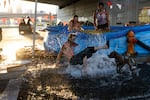A new study finds the Pacific Northwest’s extreme heat wave last summer was a freak event that should only happen once in 10,000 years and it was even hotter because of climate change.
Records were broken across the region in June of 2021, as temperatures soared as high as 118 degrees Fahrenheit. Portland saw a record high temperature of 116 degrees, while cities including Salem, Hillsboro and the Columbia River Gorge also broke their all-time records. The heat wave, known as a “heat dome” trapped hot air over the region from June 24-29. Hundreds of people died across the Northwest, and at least 96 people died in Oregon, most of whom were home alone and had no air-conditioning units.

A woman who goes only by Jamie, Tyson Morlock, and a woman who goes by Queenie plays with a dog named Prince in a swimming pool at a homeless camp under an overpass during a record-setting heatwave on June 29, 2021, in Southeast Portland
Jonathan Levinson / OPB
Climate scientists were puzzled by the high temperatures, and early studies suggested that the extreme heat wave was virtually impossible without climate change. That prompted Karen McKinnon, assistant professor of climate science at UCLA, to find answers. She wanted to know if climate models could predict such an extraordinary event and if the extreme heat is a sign of more heat waves in the future.
“The event was just so extreme even after accounting for climate change, which has added about a degree-and-a-half Celsius or three degrees Fahrenheit to Pacific Northwest temperatures since 1960,” she said. “Temperatures were still in many places on the order of 30 degrees higher than average for that time of year during the heatwave.”
McKinnon said early on, it was hard to put a number on the probability of this type of event happening in this region because it was so low.
To determine just how rare the heatwave was, McKinnon co-authored a study that analyzed 50 climate model simulations and combined historical weather station data and trends from 1850 through 2100.
They found the heat wave to be roughly a one-in-10,000-years event that was even warmer because of climate change.
McKinnon called it “climate change plus bad luck” as it was also an unusual time of year for the region to experience extreme heat.
It’s highly unlikely this extreme weather event would happen again anytime soon, she said, but because of the small shifts in temperatures, it’s already made a difference in how hot heat waves can get.
Paul Loikith, associate professor in the department of geography at Portland State University agrees. He said the study did a great job of applying sophisticated statistical techniques and quantitative perspectives to find answers to the many questions climate scientists had about the heat wave.
“The event itself appears to be an extremely rare combination of weather features that could have happened in the absence of human activity,” he said.”But the temperatures would not have been as hot if there wasn’t that influence from human activity.”
Loikith said weather is capable of a huge range of variability with or without human influence on the climate. Because of that, he said it’s hard to know just how rare this event was on a day-to-day basis since our weather data is very limited. But he said the climate is changing, and humans have had a huge impact on how we experience the weather.
According to Loikith, the Northwest still would have seen an extreme heat wave even without climate change. And as temperatures continue to rise, he said, smaller temperature increases are more noticeable.
This summer, at least a dozen Oregon cities experienced the hottest July and August on record. Portland also had seven consecutive days at or above 95 degrees, breaking its previous record set in 1981.
These weather events weren’t as extreme, Loikith said, but they do start to add up.
“As everything gets warmer, heat waves that maybe used to be in the low 90s, all of sudden they’re starting to be more in the mid-90s,” he said. “So, we start to see these streaks or these records of days above certain heat thresholds increasing.”
Loikith said when heat waves happen in the future, they will be even hotter than they were today.
